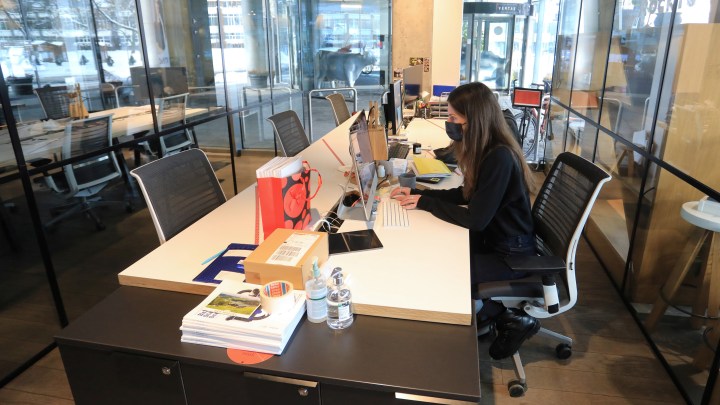
Work at the office, work from home or both? Companies are still deciding what’s best.
Work at the office, work from home or both? Companies are still deciding what’s best.

By now, most workplaces have probably drawn a line in the sand when it comes to how their employees are working — in person, remote or some combination of the two. Some of those decisions to work both in the office and at home just aren’t effective for some businesses.
Yelp says it is planning to go fully remote because, under its hybrid model, only 2% of its workspaces in its New York, Chicago and Washington, D.C., offices were being used. Other companies and their employees seem to be fine with the hybrid model.
The transition to hybrid work at Cleveland Clinic required some renovations. The medical center has about 3,000 hybrid employees, most of them in finance and information technology.
“We had some spaces that were, like, cubeville,” said Ashley Rader Sell, the Cleveland Clinic’s director of remote work.
A lot of the desk space has been changed to communal spaces, because the office serves a different purpose now. Reframing how we think of the workplace is important, she said.
“Hybrid work is remote work with the added benefit of regular, on-site interaction,” Rader Sell said. “People don’t need to come in to sit at a cube. They already can do their work at home.”
Planning of schedules and meeting spaces is the difference between a hybrid that works and a hybrid that doesn’t, said Wen Fan, a sociologist who studies remote work at Boston University.
“If you just suddenly give people the total choice, without asking their preferences or asking for their plans, then there definitely has to be some chaos,” she said.
For workers, some form of remote work is still the winning choice. Among remote-capable employees, around 40% are hybrid and around the same number are working entirely from home, a recent Gallup Poll reported.
Nicholas Bloom, an economist who studies remote work at Stanford University, admits that for tech companies, going fully remote may make more sense.
“I don’t think one size fits all,” Bloom said. It’s a balance between what kind of work companies do, what kind of employees they want to recruit and what kind of culture they want to create, he said.
There’s a lot happening in the world. Through it all, Marketplace is here for you.
You rely on Marketplace to break down the world’s events and tell you how it affects you in a fact-based, approachable way. We rely on your financial support to keep making that possible.
Your donation today powers the independent journalism that you rely on. For just $5/month, you can help sustain Marketplace so we can keep reporting on the things that matter to you.











